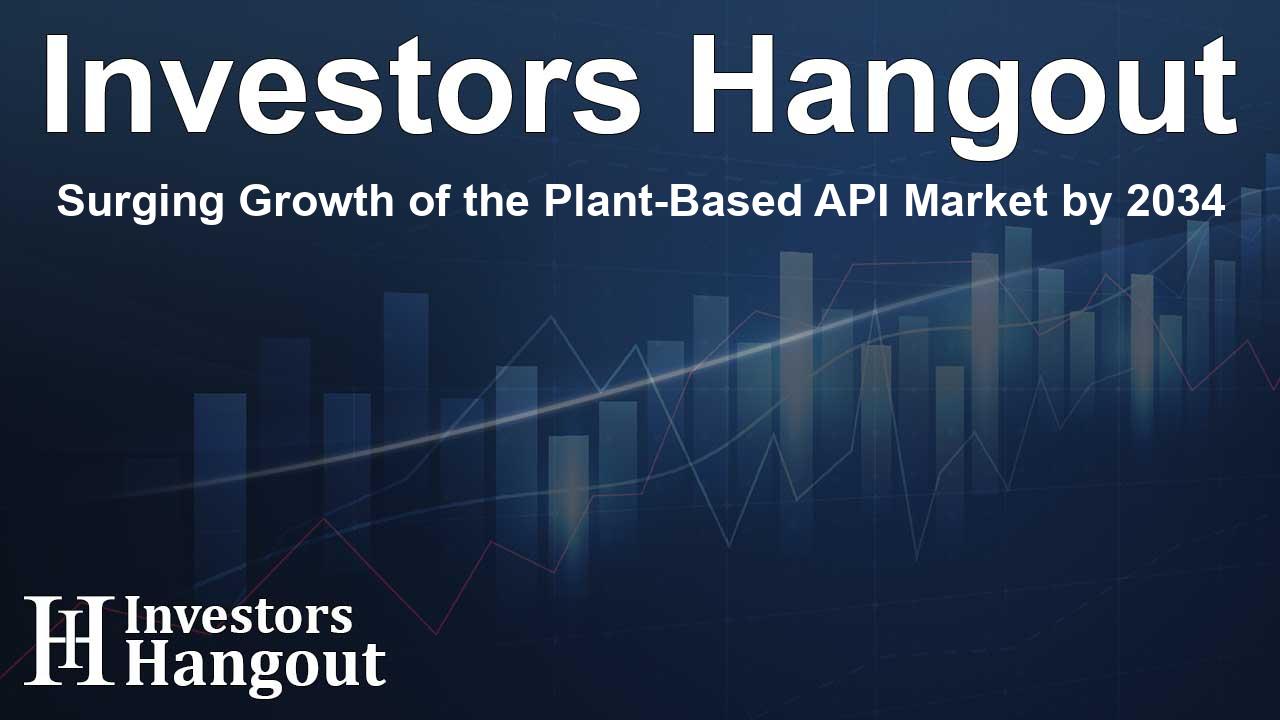Surging Growth of the Plant-Based API Market by 2034

Exploring the Rising Demand for Plant-Based APIs
The future of the plant-based Active Pharmaceutical Ingredient (API) market shines bright, with projections indicating a substantial growth trend leading to expecting a market valuation of approximately USD 52,085.9 million by the end of a decade. This growth trajectory represents a compound annual growth rate (CAGR) of 5.6%, setting the stage for a shift in the pharmaceutical landscape.
The Shift Towards Natural Remedies
The plant-based API sector is quickly gaining momentum as both consumers and pharmaceutical companies are on the lookout for sustainable, natural alternatives to synthetic drugs. These innovative APIs are extracted from various medicinal plants and herbs, which are known for their bioactive compounds that lend their therapeutic properties. As awareness increases about the benefits of plant-based treatments, the industry is responding to a growing demand for solutions that emphasize safety and sustainability.
Understanding Plant-Based APIs
Distinguished from synthetic options, plant-based APIs are sourced from renowned healing plants such as ginseng, turmeric, cannabis, and cinchona. Historically recognized for their medicinal attributes, these plants are now gaining prominence in contemporary pharmacology, more so as an alignment with global health trends advocating for greener healthcare solutions continues to evolve.
Therapeutic Applications Across Multiple Fields
Plant-based APIs are making strides in therapeutic areas that include pain management, anti-inflammatory treatments, cancer therapies, and care for respiratory and cardiovascular ailments. Their versatility is reinforcing their importance in addressing a multitude of health challenges prevalent across the globe, effectively spurring market growth as they align with society's shift towards natural healing methods.
The Emphasis on Sustainability
As individuals worldwide seek natural and holistic healthcare solutions, the plant-based API market is anticipated to play a crucial role in reshaping pharmaceutical practices. This demand surge is a reflection of broader consumer trends focusing on well-being and sustainability while addressing the pressing health dilemmas of our time.
Competitive Landscape in the Plant-Based API Sector
The competitive dynamics within the plant-based API industry are intensifying, catalyzed by strategic partnerships and new regulatory frameworks that support innovative developments. A notable component of this sector is the heightened interest in cannabis-derived compounds, which are setting new benchmarks in potency and therapeutic efficacy.
Recent Developments in the Industry
Key industry highlights illustrate the ongoing evolution within the plant-based API market. Bright Green Corporation recently initiated a letter of intent, aiming to supply DEA-approved marijuana extracts. Similarly, Indena has secured regulatory approval to produce pharmaceutical-grade cannabidiol (CBD) for commercialization across global markets.
Forecasting Regional Growth
Regional growth expectations project significant advancements in markets like India, which is anticipated to achieve the highest growth rate of 8.8% CAGR from 2024 to 2034. Following closely, China is expected to grow at an 8.7% CAGR, while South Korea and Japan will demonstrate impressive growth rates as well.
Identifying Key Market Players
Several notable companies are spearheading developments within the industry, including Abbott, Kerry Group plc, and Bright Green Corporation among others. Their collective efforts are contributing to a robust competitive environment where innovation and regulatory compliance are paramount for success.
Market Segmentation Analysis
The plant-based API market is segmented based on several criteria including product types like alkaloids, cannabinoids, and flavonoids, as well as by therapeutic applications and regions. This extensive categorization aids in identifying growth opportunities across various demographics and therapeutic needs.
Significance of the Rising Trend
This growth not only indicates a shift in consumer preference but also emphasizes the pharmaceutical industry's recognition of the potential that plant-based ingredients hold in delivering effective health solutions. In conclusion, as the world inclines more toward sustainability, the plant-based API market is poised for remarkable expansion in the coming years.
Frequently Asked Questions
What is the current market size of the plant-based API industry?
The plant-based API market is expected to reach USD 30,084.8 million in 2024.
What is the projected growth rate for the market?
The plant-based API market is projected to grow at a CAGR of 5.6% from 2024 to 2034.
What are some examples of plant-based APIs?
Examples of plant-based APIs include ginseng, turmeric, cannabis, and cinchona.
Which regions are predicted to experience the highest growth?
Regions like India and China are expected to witness the highest growth rates in the plant-based API market.
Why is there a growing trend towards plant-based APIs?
The trend is driven by increasing consumer interest in sustainability, safety, and the efficacy of natural treatments.
About The Author
Contact Hannah Lewis privately here. Or send an email with ATTN: Hannah Lewis as the subject to contact@investorshangout.com.
About Investors Hangout
Investors Hangout is a leading online stock forum for financial discussion and learning, offering a wide range of free tools and resources. It draws in traders of all levels, who exchange market knowledge, investigate trading tactics, and keep an eye on industry developments in real time. Featuring financial articles, stock message boards, quotes, charts, company profiles, and live news updates. Through cooperative learning and a wealth of informational resources, it helps users from novices creating their first portfolios to experts honing their techniques. Join Investors Hangout today: https://investorshangout.com/
The content of this article is based on factual, publicly available information and does not represent legal, financial, or investment advice. Investors Hangout does not offer financial advice, and the author is not a licensed financial advisor. Consult a qualified advisor before making any financial or investment decisions based on this article. This article should not be considered advice to purchase, sell, or hold any securities or other investments. If any of the material provided here is inaccurate, please contact us for corrections.
